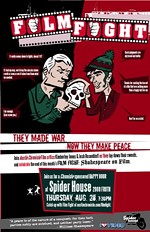The Man Who Hath No Music in Himself
By Josh Rosenblatt, 2:36PM, Wed. Aug. 20, 2008

First let me say that watching all this Shakespeare is having an odd effect on my brain. There was a moment the other night when some actor was soliloquizing on love or murder or truth or beauty or footwear, and all those antiquated words just turned to jelly in my ears. I could have sworn I was listening to Hungarian.
A few quick things about Love’s Labour’s Lost before I go to the dentist. Then I’ll be back, grouchier than before.
It’s amazing to me that anyone could look at that clip you put up and not want to thrown him or herself off a bridge. I don’t know how he does it, but somehow Timothy Spall actually manages to out-ham his costar Nathan Lane. I didn’t realize that was possible. In a movie that prides itself on chewing its beautiful scenery to dust, Spall is the undisputed heavyweight champion of scenery chewing, a living, breathing testament to the extremes of human behavior, a theatrical canary in the coal mine gauging just how far an actor can go into the realm of the antic before audiences riot in their seats.
I love musicals – love them – and I’m perfectly fine with the notion that they often come with outsized characters doing outsized things on outsized soundstages. But there’s a difference between playing things broad and playing them omnivorous. And Spall, under Branagh’s watch, has created a character that goes beyond cute and into the realm of the cartoonishly absurd, a giant and terrifying beast of musical comedy, crying out for attention and willing to beat its audiences into laughter and enjoyment if it has to.
As for the film’s use of songs from the Great American Songbook, you will never get me to argue that the music of Gershwin and Porter and all the others isn’t great. If I did, my Dad would rise out of his grave to ground me. No, the problem starts when you decide to make a musical but refuse to write your own songs, choosing instead to comb through the back catalog of American classics for a few songs that bear at least a passing resemblance to the story you’re telling. Who cares if the lyrics to “They Can’t Take That Away From Me” don’t exactly correspond with the sentiment of the scene you’re shooting; it comes close: These girls are leaving; these boys are staying; hearts are breaking; but love will survive. Perfect! Throw it in and move on!
Maybe so, but the problem is it speaks to a certain laziness that gets in the way of one’s enjoyment if one chooses to pay attention to the actual lyrics of the songs the director chose. (Woody Allen had this exact same problem in Everyone Says I Love You; and I was so looking forward to hearing the lyrics he was going to write.) Take, for example, when the prince starts singing “I’ve Got a Crush on You” to Alicia Silverstone’s picture:
“But you had such persistence, you wore down my resistance.” That’s a great line; no one could turn a lyrical phrase like Ira Gershwin. But the problem is the Prince just met Silverstone’s character the night before. And though he was forced to show a little resistance because of his princely no-women-for-three-years decree, I think you’d be hard pressed to point to any persistence Silverstone had shown up to that point. Again, their relationship had only existed for 12 hours, most of which they spent asleep.
I know, I know, I know: It’s a small point, right? A minor problem? Some small trifle a captious critic is blowing up into something more damning than it needs to be? But if you’re out to tell a story, and you’ve made the choice to tell at least part of that story in song, why would you choose songs that were written without that story in mind? That have nothing to do with that story? To just throw some old songs willy-nilly into a narrative framework and assume they’ll work because they kinda sorta deal with the same general issues that narrative does, strikes me as the height of laziness (and maybe arrogance: who is Kenneth Branagh to tell Cole Porter what his lyrics mean?). C’mon Kenneth, sit down, grab a pen, and write some lyrics. You can do it. Then call one of your dozens of famous music friends and have them whip you up a melody. Then repeat the process six or seven times and you’ve got yourself a musical.
I’ve got more to say about this movie, Kim, so don’t go drifting off to A Midsummer Night’s Dream just yet.
A note to readers: Bold and uncensored, The Austin Chronicle has been Austin’s independent news source for over 40 years, expressing the community’s political and environmental concerns and supporting its active cultural scene. Now more than ever, we need your support to continue supplying Austin with independent, free press. If real news is important to you, please consider making a donation of $5, $10 or whatever you can afford, to help keep our journalism on stands.










